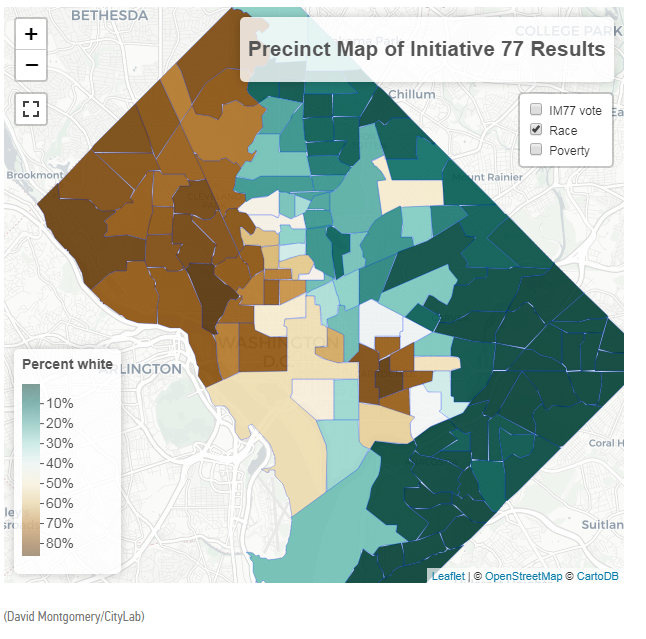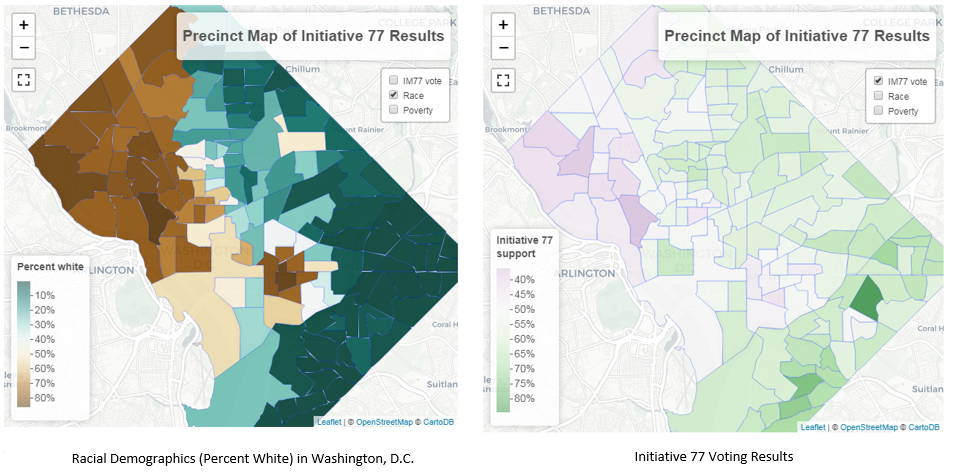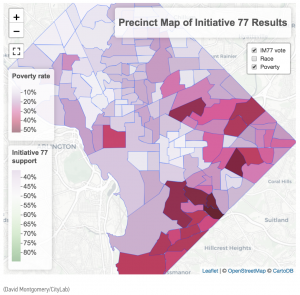Abortion rights, women of color, and LGBTQIA+ people are under attack. Pledge to join us in fighting for gender justice.
D.C. Councilmembers Turn Back on D.C. Voters and Tipped Workers

Earlier this week, DC Council Chair Philip Mendelson and a majority of his colleagues on the 13-member Council quietly introduced a bill to repeal Initiative 77, a measure to raise wages for tipped workers in the District that passed with close to 56 percent of the vote on DC’s June 19th primary ballot.
The very next day, Rep. Mark Meadows (R-NC), a Tea Party leader in Congress, introduced an amendment to federal budget legislation in Congress that would block DC from using any federal or local government funds to enforce Initiative 77.
In other words, a Democratic majority of the DC Council and the leader of the ultra-conservative House Freedom Caucus now are both working toward the same goal: nullifying the votes of 47,230 DC voters who agreed that $3.33 an hour is not enough and that it’s time to ensure that people who work for tips—most of whom are women and people of color—get the same minimum wage from their employers as anyone else, with tips on top.
I am one of those voters—and I am mad as hell. As a DC resident, I am largely disenfranchised. I lack any real representation in Congress, and the same unrepresentative Congress regularly meddles in DC affairs, overriding local laws and ignoring the wishes of DC voters. But I also often feel lucky to live in a place where the progressive local government has passed laws to guarantee paid sick days and paid family and medical leave, combat discrimination, protect women’s access to reproductive health care, and more—and where I had the opportunity to cast my own vote in favor of One Fair Wage for the District. It is enragin g to see the Council that is supposed to represent me dismiss the will of D.C. residents as it seeks to overturn my vote and the votes of 47,229 of my neighbors, who, as D.C. residents, too often have their votes ignored. (At least D.C.’s nonvoting delegate in Congress, Eleanor Holmes Norton, is speaking up against the Tea Party and fighting for the rights of D.C. voters; she deserves to have the D.C. Council at her side in this fight.)
When I find myself asking how it happened that the D.C. Council took up the cause of blocking the will of D.C. voters, I’m afraid the answer is a predictable one: moneyed power.
It’s the corporate power of the restaurant industry, which spent hundreds of thousands of dollarts attempting to defeat Initiative 77 and led a potent and effective misinformation campaign directed to voters, Councilmembers, and tipped workers themselves. The doomsday scenarios promised by initiative opponents—of a District with scarce restaurants and paltry tips—run counter to all evidence from the states that already have One Fair Wage, where tipped workers have higher wages and lower poverty rates compared to their peers in other states and restaurants still thrive. But while most DC voters weren’t fooled, the restaurant industry appears to have the same hold on the DC Council as it does on Congress (which hasn’t let the $2.13 federal tipped minimum wage go up since 1991).
It’s the power, too, of the white, wealthy residents who predominate in Ward 3—the only ward in which the initiative failed to pass—and who have outsize influence in every political sphere. Shockingly, the Councilmembers representing D.C. Wards 7 and 8–lower-income, predominantly Black neighborhoods where the initiative passed with more than 60 percent of the vote–have co-sponsored the repeal bill. CityLab created a striking illustration of how the 77 vote broke down along racial and income lines:

 And thus we find ourselves in a world in which the same Democratic DC Council Members who decry taxation without representation are aligned with a Tea Party Republican in their desire to disenfranchise DC voters and maintain the unfair two-tiered minimum wage system that exposes DC’s most vulnerable workers to increased risks of harassment and poverty.
And thus we find ourselves in a world in which the same Democratic DC Council Members who decry taxation without representation are aligned with a Tea Party Republican in their desire to disenfranchise DC voters and maintain the unfair two-tiered minimum wage system that exposes DC’s most vulnerable workers to increased risks of harassment and poverty.
But all is not lost. The Council is about to begin its summer recess, and Members will not act on the repeal bill until after they return in September. Over the next two months, let’s make clear to Councilmembers that it is their obligation to listen to their constituents, respect our will, and abandon this anti-democratic, anti-progressive, anti-worker proposal, so that DC can lead the way to One Fair Wage.





